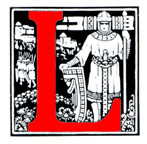 ike many major Victorian writers, including Carlyle, Ruskin, the Brownings, and Eliot, Morris grew up in an evangelical household, and like them, he abandoned his belief. However, unlike so many others with an evangelical heritage, Morris seems to have left behind his childhood belief without first undergoing the standard Victorian agonizing spiritual upheaval.
ike many major Victorian writers, including Carlyle, Ruskin, the Brownings, and Eliot, Morris grew up in an evangelical household, and like them, he abandoned his belief. However, unlike so many others with an evangelical heritage, Morris seems to have left behind his childhood belief without first undergoing the standard Victorian agonizing spiritual upheaval.
Unlike Pugin, his medievalism included no place for a revival of Roman Catholic or any other faith, and when he creates his ideal worlds in fantasies, religion never plays any role. In his mature years, Morris seems simply to have ignored religion and did not follow one of the usual Victorian paths — becoming an atheist (as did Swinburne and Thomson), or developing his own form of liberal Christianity (as did Ruskin, Tennyson). Unlike Swinburne, he saw no need to profess an aggressive atheism, and his literary works, particularly the great prose fantasies, such as The Water of the Wondrous Isles, devote almost no attention to religious belief at all.
Last modified 5 July 2007